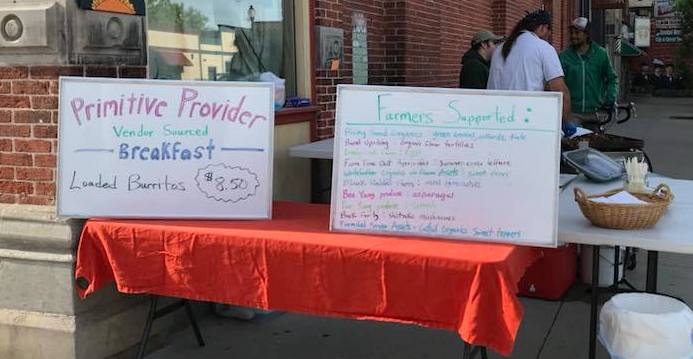Grocery Greens

“Okay, we need to plant 250 bed feet of Magenta lettuce heads…”
“Nope—260. That extra 10 is for the Coop!”
This interaction takes place almost weekly at our planning meetings, as Oren pines through the annals of his master Production Spreadsheets, organizing us for the week of planting ahead, and Polly interjects her smug reminder about our Coop contract. The tone of Polly’s interruption, coupled with the scale of adjustment, has always struck me as quite hilarious, but last week, upon seeing that Rising Sand Organics logo on the Coop shelf –above a wonderful and vibrant bag of greens – I experienced firsthand the gravity of what it means to be a farmer: growing and selling wonderful food within our wonderful community.
A significant component of small-scale farming, it turns out, is the actual sale of the food that we grow, and in addition to our roles as weeders; hoers; builders and mulchers, we’re now taking on the administrative requirements of harvest, marketing and sales coordination. A great deal of logistical puzzling is required to carry out contracts with the Coop and other retailers, CSA members, Farmers’ Markets, and wholesale customers (restaurants, etc.), but this diversity of income stream provides some stability and flexibility in the uncertain landscape of produce sales.

We’ve touched on the basics of CSA (Community Supported Agriculture) a bit earlier (see our website for more details and signup information), but on the level of the nitty-gritty, this program entails the coordinated harvest, packing and transportation of equivalent boxes of pristine crops to a large number of families, at multiple delivery points throughout the area. Every detail — from the style of packaging material and washing/packing practices to the route of the Shadow and online sign-up procedures — needs to be worked out on a continual basis in order to pull off the immense logistical feat of providing a wide variety of wonderful food to a wide variety of wonderful people.

Another key to our financial success this season will be restaurant sales and wholesale distribution. We’re currently opening and reopening communications with a variety of restaurants in the area in preparation of prime harvest season, to establish the rhythm of regular availability lists, orders and deliveries. With restaurants, communication and quality are keys, and as a kitchen manager I can attest to the necessity of quality, cleanliness and dependability on the part of farmers – all of which come, of course, with their own individual levels of stickiness and time requirement. I, however, cannot wait to grace the plates of our Mission Coffee customers with the wonderful produce coming off of our fields, and the full-circle vitality of this arrangement warms my heart thoroughly, in the midst of the dollar-to-dollar nature of making a living.
Our final major sales stream will consist of Farmers’ Markets, and Rising Sand will be represented at the Stevens Point, Neenah and Appleton Markets, in addition to a small, one-stand market at the Portage County Health Care Center on Tuesday nights. I’m quite excited about manning this market stand — taking advantage of the excuse to sit still in one place for an extended period of time, and, more importantly, interacting face-to-face with our customers, and conversing about what we do, and how and why we do it. The fact is that we care for our land, our plants and our community, and we’re proud of what we do. In order to maintain this level of care, and continue farming and enhancing our land, we’ve got to sell our food. I, for one, am immensely grateful to every person and business that recognizes the value of the food that we grow, and provides their support. I hope it never gets old seeing our produce on market stand signs and grocery aisle markers around Stevens Point.
